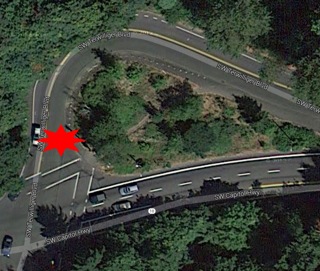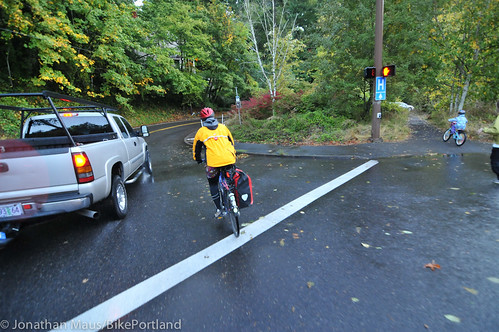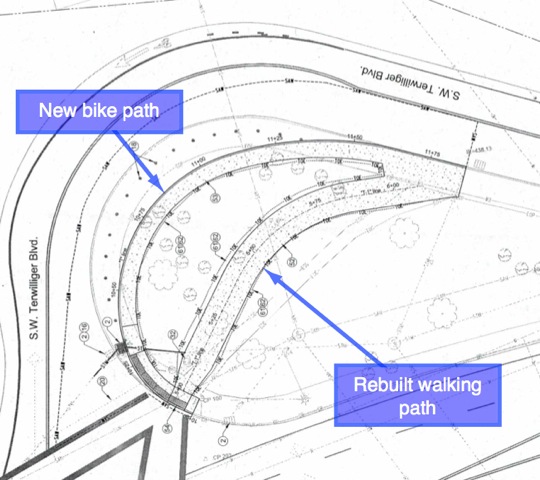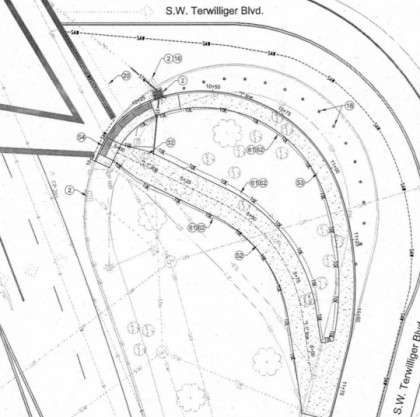
(Red marks the narrow spot that is
currently a safety issue.)
A nerve-wracking and dangerous pinch-point on a heavily traveled section of SW Terwilliger Blvd will be the site of Portland’s newest separated bike path. The location is the northeast corner of the intersection of Terwilliger and Capitol Highway (map) — or what is affectionately known by some local residents as the “teardrop”.
This small parcel of land is managed by the Portland Water Bureau and they’ve sought changes to it for years due to problems large truck and bus operators have negotiating the curve it creates on Terwilliger. The curve is also quite dangerous for people riding bicycles because it narrows the road suddenly and there’s not room for a large motor vehicle and a person on a bicycle to fit side-by-side.
Back in 2012, I highlight$ed this intersection in my ‘Ride Along’ with a family from the area. Barbara Stedman, who bikes through this intersection nearly every day with her young daughter and husband, told me it was a serious safety concern — and she nearly got squeezed by a truck right before my eyes.

(Photo by J. Maus/BikePortland)
Enter Keith Liden, one of Portland’s most effective and experienced citizen bicycle advocates. Liden is well-known at PBOT and at City Hall for his southwest Portland bike advocacy (often aided by other advocates via the SW Trails group). Last fall, when Liden got wind of a Portland Water Bureau project that would trigger changes to the teardrop, he immediately checked the plans to see if they’d given any thought to bike facilities. Worried that they hadn’t, Liden’s next call was to PBOT to tell them this was a golden opportunity to fix a glaring bike safety issue. “Several of us in southwest made it clear that the design was deficient and bikes needed to safely accommodated,” he shared with us via email.
About a year later, Liden checked back in and realized that the Water Bureau project was still on schedule, but that PBOT hadn’t given the bikeway issue any thought since last year. So Liden, a transportation planning consultant by day, took the issue into his own hands (which he often does). He went out to the site and drew up some simple designs that would create space for a dedicated bike path around the teardrop. He then shared his designs with PBOT and other neighborhood activists.
While everyone seemed to like Liden’s ideas, PBOT told him at the time that there simply wasn’t any money in the budget for the bike path. That didn’t sit well with Liden because he figured that a four-foot path that runs about 200 feet couldn’t cost more than $3,000 to $4,000. He ran those numbers by PBOT, and urged them to find the money. (Note: PBOT says the bike path addition was much more than that, about $25,000 for design and engineering.)
Given the obvious bike safety issues, Liden wondered, couldn’t PBOT find a few thousand dollars “in the couch cushions” to do this project right? Liden even suggested PBOT could use the money they saved when Sunday Parkways in southwest Portland was cancelled earlier this year.
Liden’s advocacy paid off when he got an email from PBOT last week saying that a new bikeway will be constructed as part of the Water Bureau project. It turns out a few PBOT staffers advocated internally for the project.
According to the official project design drawings we obtained from PBOT (below), the rebuilt teardrop will come with a new path for bicycles that will be separated from other traffic and will run along the outside edge of the parcel.

In the end, Liden says he’s “very pleased” with the result; but he tempers his appreciation with a note of caution. “With the always grim funding environment, PBOT must take every advantage of installing bicycle facility improvements when they can be included at reduced cost with another project such as this one. We must squeeze the most out of every dollar.” However, Liden adds, “This is no way to run a railroad. This [opportunistic approach and coordination between city bureaus] should be automatic behavior – not something driven by a citizen complaint.”
— PBOT says this project is scheduled for completion in summer of 2014.

